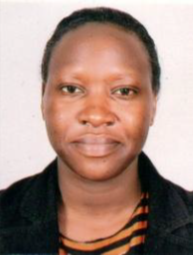Leila Ndalilo

Leila Ndalilo
Research Scientist II
| : indalilo@kefri.org | |
| Researcher ID | :0000-0002-1771-8604 |
| Designation | : Reseacrh scientist II |
| Expertise | : Social ScienceLeila Ndalilo |
Journal Papers
- Ndalilo, L., Kirui, B. and Maranga, E.K (2020). Socio-economic drivers of degradation and their implication on conservation of River Lumi riparian ecosystem in Kenya. Open Journal of Forestry, 10,307-319.
- Mbuvi, M.T.E., Ndalilo, L., Matiku, P., Munguti, S. and Odera, G. (2020). Yearning for an Apple: The Changing Lifestyle of the Tana River Delta Communities in Kenya and Implications on Livelihoods and Conservation of Natural Resources. Natural Resources, 11, 446-472.
- M.T.E. Mbuvi, L. Ndalilo, C. Wekesa, P. Matiku and S. Munguti (2020). Engagement of decision makers for improved management of shared resources for enhanced community benefits and adaptation to the changing climate in Tana River Delta, Kenya. Research and Reviews: Journal of Ecology and Environmental Sciences 8(3): 1-15.
- Mbuvi, M. T. E., Musyoki, J. K., & Ndalilo, L. A. (2020). Forest Management Teams, a Citizenship Paradigm Analysis through Influence and Importance Factors; Experience from Arabuko Sokoke Forest, Kenya. Open Journal of Forestry, 10, 81-109.
- Mbuvi, M. T. E., Ndalilo, L., & Hussein, A. (2018). Applying Sustainability and Ethics in Forest Management and Community Livelihoods: A Case Study from Arabuko Sokoke Forest, Kenya. Open Journal of Forestry, 8, 532-552.
- Mbuvi, M.T.E, Ndalilo, L. and Cheboiwo, J. (2018). Challenges to Actualization of Decentralization Forest Management Functions: Experiences and Lessons on Devolving Forestry Management Functions in Kenya. Public Policy and Administration Research, Vol.8, No.10, 2018
- Ndalilo, L., Mbuvi, M.T.E and Luvanda, A.M (2017). Utilization and governance of Arabuko Sokoke Forest. In Biodiversity status of Arabuko Sokoke forest, Kenya. Kenya Forestry Research Institute, Nairobi, Kenya.
- Wekesa, C, Ndalilo, L, Ongugo, P, Leley, N and Swiderska, K, (2015). Traditional Knowledge Based Innovations for adaptation and resilience to climate change: The case of Coastal Kenya. Paper submitted to XIV World Forestry Congress, Durban, South Africa, 7-11 September 2015.
Books
- Ochieng’ D., Luvanda, A., Wekesa, C., Mbuvi, M.T.E., and Ndalilo, L. (2017). Biodiversity Status of Arabuko Sokoke Forest, Kenya. KEFRI/KCDP. 66 Pages.
Book Chapter
- Ndalilo L., Wekesa C., Mbuvi M.T.E. (2020). Indigenous and Local Knowledge Practices and Innovations for Enhancing Food Security Under Climate Change: Examples from Mijikenda Communities in Coastal Kenya. In: Gasparatos A. et al. (eds) Sustainability Challenges in Sub-Saharan Africa II. Science for Sustainable Societies. Springer, Singapore.
- Mbuvi and Ndalilo, L. (2019). Utilization and governance of Buda Forest. In Biodiversity status of Buda forest, Kenya. Kenya Forestry Research Institute, Nairobi, Kenya.
- Wekesa, C, Ndalilo, L, and Swiderska, K. (2016). Kaya forests: role in Climate change adaptation among the Mijikenda community. In Socio-ecological Production Landscapes and Seascapes in Africa. United Nations University Institute for the Advanced Study of Sustainability, Tokyo, pp. 66-74.
- Wekesa, C. and Ndalilo, L. (2018). Sustainable use of biodiversity in socio-ecological production landscapes and seascapes (SEPLS) and its contribution to effective area-based conservation: The case of Kaya forests on the Kenyan Coast. In Sustainable Use of Biodiversity in Socio-ecological Production Landscapes and Seascapes and its Contribution to Effective Area-based Conservation.
Technical Notes /Protocols/Guidelines
- Wekesa, C., Ongugo, P., Ndalilo, L., Amur, A. Mwalewa, S. and Swiderska, K. (2017). Smallholder farming systems in coastal Kenya: Key trends and innovations for resilience. International Institute of Environment and Development.
- Ongugo, P, Wekesa, C, Ongugo, R, Abdalla, A, Ndalilo, A. L and Pakia, M. (2014). Smallholder Innovation for Resilience. Qualitative Baseline Study, Mijikenda Community, Kenyan Coast. International Institute for Environment and Development.
Employment History
- August 2018 to date: Research Scientist II, Kenya Forestry Research Institute, Coast Eco-Region Research Programme, Gede.
- February 2014 – July 2018: Assistant Research Scientist, Kenya Forestry Research Institute, Coast Eco-Region Research Programme, Gede.
- January 2012 – February 2014: Research Intern, Smallholder Innovation for Resilience Project, Kenya Forestry Research Institute, Coast Eco-Region Research Programme, Gede.
Academic Qualification
- 2018-To date: Currently pursuing Doctor of Philosophy in Natural Resource Management, Egerton University, Kenya.
- 2012-2015: Master of Environmental Studies and Community Development, Kenyatta University, Kenya.
- 2005-2009: Bachelor of Environmental Studies and Community Development, First Class Honours, Kenyatta University, Kenya.
Key Competences
- Forestry and Natural Resource Management
- Community Development
- Project Management
- Forest management planning
- Grant proposal development
Other Courses
- Summer school on Sustainable management of Natural Resources in Africa. Enhancing Knowledge and Skills of Young African Scientists for a Better Tomorrow’, held from 28th July to 10th August 2019 at the University of Abomey Calavi, Republic of Benin.
- Training on Environmental Impact Assessment and Audit held from 1st August to 25th August 2017 at Technical University of Mombasa